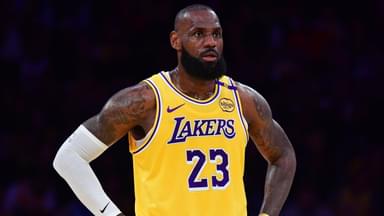LeBron James’ first signature shoe, the Nike Air Zoom Generation, was released in 2004. The Air Zoom Generation was an instant hit among fans and became a cult favorite in the sneaker community.
Advertisement
However, the first 6 years of LeBron’s shoe sales were good, not great. Nike’s average revenue generated from the LeBron sneaker line ranged in the neighborhood of $100 million domestically.
Jordan Brand, on the other hand, was making billions of dollars annually at that point. Michael Jordan had a lifetime deal that gave him his own brand, but his 5% royalties meant that he cost Nike less in terms of percentage revenue than James.
Therefore, the Swoosh was initially not too interested in signing The King to a big-money extension. This was despite the fact that James had a universally beloved story and had matched his High School hype.
Simply put, he wasn’t as attractive as a brand ambassador as the man whose ghost James would end up chasing.
Brian Windhorst reveals how Maverick Carter ingeniously earned LeBron James a big payday from Nike
Maverick Carter, who’d been a member of James’ inner circle since high school, became LeBron’s personal negotiator in 2008. The LRMR Ventures co-founder found a way to maximize James’ revenues from Nike. Brian Windhorst related the story of James’ extension with Nike in his book LeBron Inc:
“Nike was happy with LeBron and was eager to re-sign him. But this time there would be no all-out bidding war and no record contract. Nike wasn’t willing to increase his annual guarantee, which was $11 million, dramatically.”
“There was an option to extend the deal, but Carter preferred to negotiate an entirely new contract. What Carter wanted, though, was to negotiate a profit participation package so that the better Nike did selling the shoe, the better LeBron would do.”
Extremely late to it, but just finished the audiobook version of “LeBron, Inc.” by @WindhorstESPN. Would highly recommend for anyone interested in learning more about how LeBron built his business empire. pic.twitter.com/uSaPVNmB9C
— Harrison Faigen (@hmfaigen) April 9, 2023
“The contract came at the right time. With the momentum from winning 2 MVP awards, LeBron entered a prime period where his popularity and shoe sales would boom.”
“By 2013, the shoes crested the $300 million mark in annual sales. They went even higher in the next few years, industry analysts said, returning tens of million dollars to LeBron in royalties.”
The King was already a financial bigwig by the time
James had come to capture America’s imagination by the time negotiations for his Nike extension came up. He was 3rd among American sportspersons in money generated from endorsement deals, behind only Tiger Woods and Kobe Bryant.
James netted over $40 million as a brand ambassador for Nike, Coca Cola, State Farm, McDonald’s, Upper Deck, Beats, and Microsoft in the year 2010. He’s worth over a billion dollars today, and nobody would’ve doubted his prospects of coming this far financially even then.






